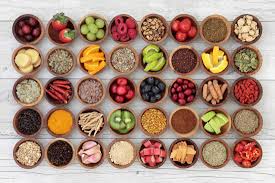
Heart Health Awareness Month and National Nutrition Month bring attention to lifestyle factors you should consider regarding heart disease, heart conditions. When we think about heart disease we should take the time to consider our nutrition. There are key fruits and vegetables that are especially good for your heart and teeth.
Nutrition for Heart Health
Many fruits and vegetables are very beneficial to your heart health.
- Berries are high in heart-healthy polyphenols, raspberries particularly have a lot of fiber (8 grams in a one-cup serving).
- Oranges are well known for their vitamin C content, but they also contain pectin, a kind of insoluble fiber that’s important for heart health.
- Tomatoes, like pomegranates, are a good source of potassium, and contain lycopene, a powerful antioxidant linked to heart health. Tip: Cooking tomatoes helps release their lycopene.
- Spinach is high in nitrates, which are linked to blood vessel health. It contains 181 percent of the daily value (DV) for vitamin K, which promotes heart health, in each one-cup serving.
Nutrition for Your Teeth
When it comes to the health of your teeth, you really are what you eat. Sugary foods, such as candy and soda, contribute to tooth decay. One of the first areas to decline when your diet is less than ideal is your oral health, according to the American Dental Association (ADA). Use this healthy foods list to improve your diet and the health of your mouth:
We Suggest:
- Leafy greens such as kale and spinach also promote oral health. They’re high in calcium, which builds your teeth’s enamel. They also contain folic acid, a type of B vitamin that has numerous health benefits, including possibly treating gum disease in pregnant women, according to MedlinePlus.
- While the ADA recommends steering clear of most sweet foods, there are some exceptions. Fruits, such as apples, might be sweet, but they’re also high in fiber and water. The action of eating an apple produces saliva in your mouth, which rinses away bacteria and food particles. The fibrous texture of the fruit also stimulates the gums. Eating an apple isn’t the same as brushing your teeth with a toothpaste that contains fluoride, but it can tide you over until you have a chance to brush. Pack either a whole apple or apple slices in your lunch to give your mouth a good scrubbing at the end of the meal.
- Carrots are crunchy and full of fiber. Eating a handful of raw carrots at the end of the meal increases saliva production in your mouth, which reduces your risk of cavities. Celery acts a bit like a toothbrush, scraping food particles and bacteria away from your teeth. It’s also a good source of vitamins A and C, two antioxidants that give the health of your gums a boost.
Although Heart Health Awareness Month came to a close, National Nutrition Month just started. It is a great time to get excited about different foods and how the contribute to a healthy body and mouth!
Farber Center takes your oral health and total body health seriously. We look forward to seeing you at your next appointment.
Comments are closed.
